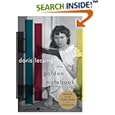
I read Doris Lessing's The Golden Notebook some months ago for book club. It was a fascinating novel. There are multiple characters. There are all sorts of interesting themes to the book. Particularly about group dynamics - one of the main characters is a communist. She's actually dating the "alpha male" leader in the communist group in Africa. Other themes include race in colonial Africa and the process of writing, parenting, idealism and going through a nervous breakdown (expecting life and the world to be different than they are).
The novel is considered a classic, particularly a feminist classic. So I hesitate to offer much criticism of the writing or the themes. My book club found (and I agreed) that some of the characters were not terribly sympathetic. The male characters were not fleshed out (perhaps that was part of the point). The female characters seemed to do inconsistent things. Inconsistent not in a "human" way, more in a "what were you thinking?" type of way. It may have also been over-wrought/over-analyzed - too detailed.
At one point, one of the characters, a mother, writes that the only thing she is living for is her daughter, Janet. Yet throughout the book, the daughter (Janet) is an empty character, barely fleshed out. You rarely see any caring gestures from the mother towards the daughter, The mother (I think it was Anna) - seemed to like the "idea" of her daughter more than her daughter herself.
With that said, it was written prior to "The Feminist Mystique", in a time before many of the societal issues surrounding women were being explored. It spoke about the different "compartments" that women were forced to live in, the main character writes about different aspects of her life in four separate notebooks.
One of the more thought-provoking parts of the novel was the notion of "free women". Free women being defined as women without a husband. The main characters are free, both divorced - and yet their lives still are not really free. They (the women) still seem to make choices based on the men in their lives. Anna, in particular, has a long
affair with a married man - and is devastated when he breaks off the relationship. Despite being a self-supporting single mom (and being proud of that), she can't seem to break free of being focused on when he will call, making dinner for him when he stops by, etc. She observes that to some extent, although she'd like to think she was
"free", and some of the more traditional wives might be jealous of her situation - she's actually just another side of the same coin as the wife. The men in the story had mistresses, but they wouldn't leave their wives for their mistresses.
Women couldn't break free of being defined by where they were in relationship to a man.
I think of the scene in the movie "The Ice Storm" where Sigorney Weaver's character says to Kevin Kline's character, in turning him down, that she already has a husband - she didn't want another one.
I don't think Lessing is suggesting that things should be this way, but I don't think she has any answers either. I also find it hard to believe people considered it "abrasive and inflammatory" back in the day. I'm looking at it from a 21st century perspective though.
The novel is clearly a product of the time right after World War II, the 50s, prior to women's liberation.
This is an article Doris Lessing wrote about the novel:
January review in The Guardian
I think we're all a product of our surroundings, our society. It's up to us (as I read some great advice the other day) to strike out on our own. Some things we can get away from, some things we just can't. I would like to think that as a society we have moved past the notion that marriage brings happiness and security - or that being single is ideal. That throwing out convention will work. I don't know - it's complex because it's simultaneously saying that throwing out convention won't work, but it's also saying the current arrangement isn't working. I really have no idea where that leaves us.
Fortunately, we're no longer in the 50s, so my hope is that much of what Lessing observed has changed. I know it has, partially. Consciousness seems to be the most important piece to this puzzle.

No comments:
Post a Comment